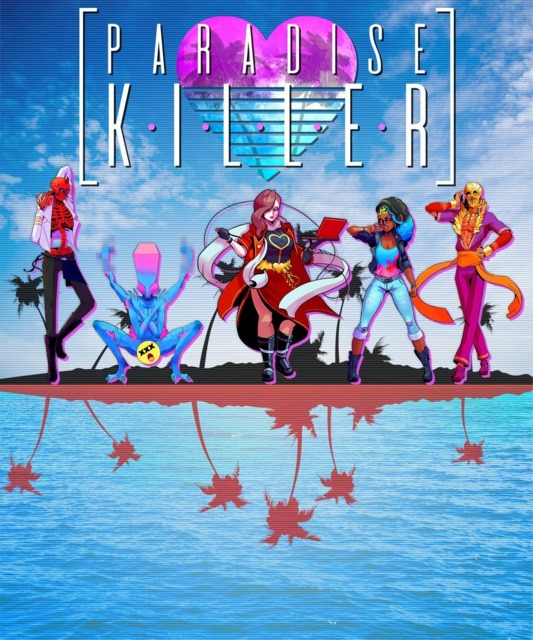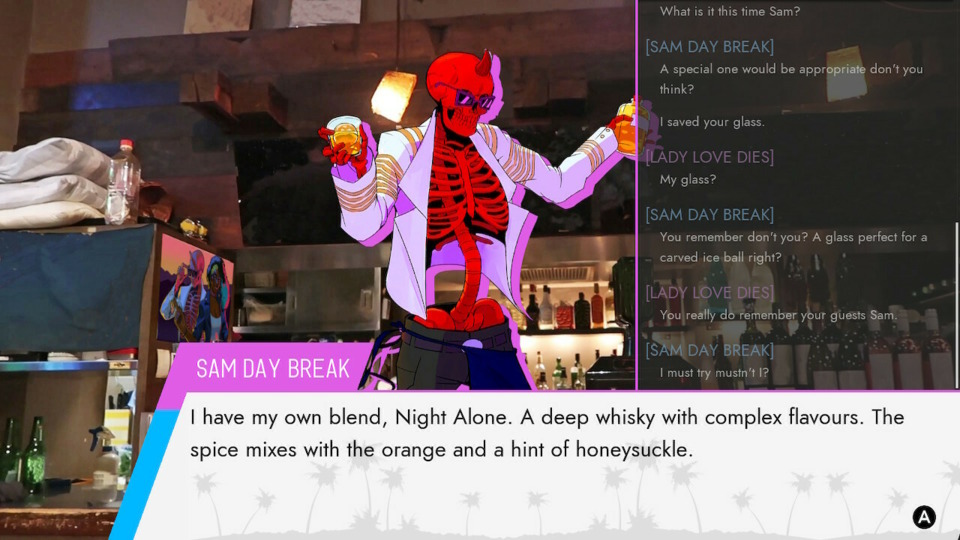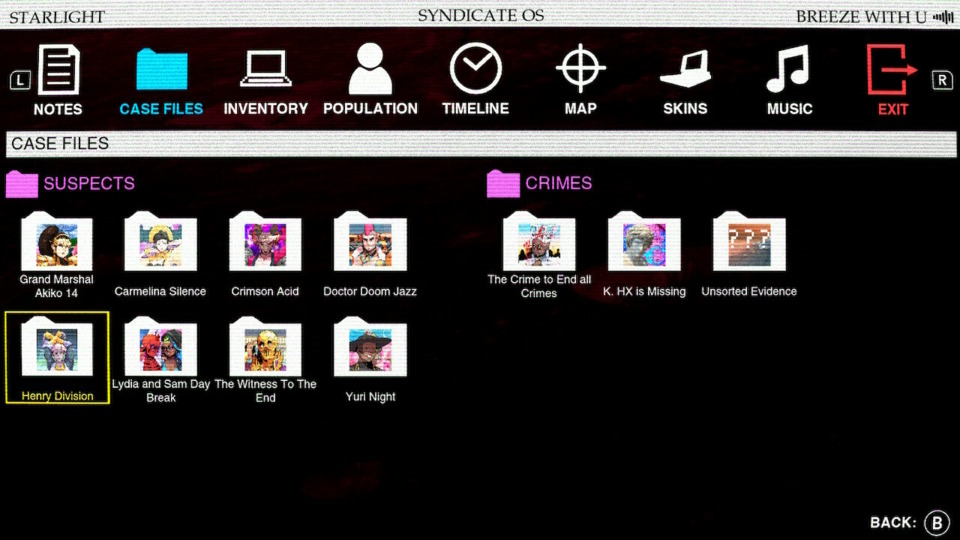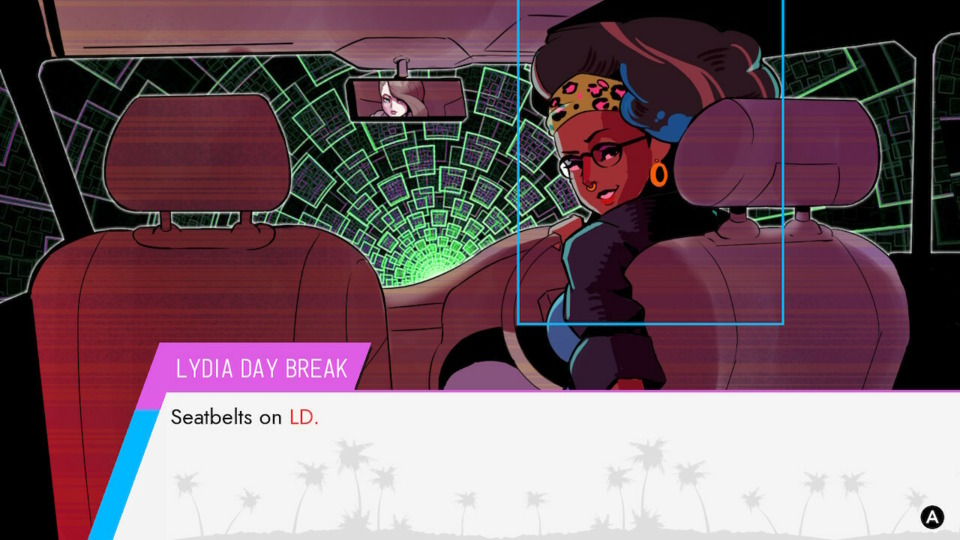Go! Go! GOTY! 2020: Game 5: Paradise Killer
By Mento 3 Comments

- Game: Kaizen Game Works's Paradise Killer
- Release Month: September.
- Quick Look: N/A.
- Started: 10/12.
- Completed: 11/12.
In my bad habits, I sometimes lead my reviews with something noncommittal and inconsequential like "this game was not what I expected"; I feel like such a sentiment would be too much of a facile understatement when it comes to Kaizen Game Works's Paradise Killer, however, as it's a metaphysical murder mystery game set on an artificial island paradise pocket dimension built by immortal zealots who worship all-powerful cosmic entities. Functionally similar to something like Spike Chunsoft's Danganronpa - that is, a visual novel driven by crime scene investigations and evidence-led testimony in court - Paradise Killer also presents a surprisingly vast open-world 3D game across an island filled with trash, treasure, currency, secrets, and sometimes valuable clues to uncover. The required nature of the last item on that list makes encountering the rest mostly incidental, though there's enough worldbuilding packed into those finds to make their pursuit worthwhile.
Speaking of which, the game is not shy about throwing the player in the deep end of a particularly abyssal pool when it comes to its oblique setting and backstory. In as brief and spoiler-free as I can make it: at some point in humanity's past we found ourselves in contact with beings beyond the stars that referred to themselves as gods. After many centuries, with mankind split among the slave armies of these various cosmic entities, we were able to throw off the yoke of oppression and either slayed, imprisoned, or chased off the gods that subjugated us for so long. In its dying moments, one of these gods gifted a small faction of loyal human zealots named the Syndicate both immortality and the ability to create "island sequences": tropical-themed pocket dimensions from which they could launch attacks on the newly emancipated human race and recover the gods they had captured, whom would then be interred in pyramid tombs until their strength had recovered. A regular influx of "citizens" - humans abducted from the real world - are used as slave labor and chattel, forced to worship the Syndicate's gods to supply them with nourishing psychic energy until it was time to ritually mass-sacrifice them all and begin anew on a fresh island. In the present era, the nine-member ruling council of the Syndicate has been slaughtered to a man, and it's up to a formerly exiled Syndicate investigator named Lady Luck Dies to determine the culprit or culprits.

It's a hell of a lot to take in, and naturally you have to derive much of this information yourself from context once you begin, but Paradise Killer luxuriates in both its absurdity and its style and you either find yourself rolling along in its distinctive groove or slamming up against its alienating strangeness like a brick wall. The closest approximation of what the developers were going for, as far as I could tell, was something like Grasshopper/Goichi "Suda51" Suda's Killer is Dead, or earlier projects like Killer7 and The Silver Case. Much of Suda's telltale aesthetic and narrative flair is invoked here, including electronically modified voice clips, heavily artifacted images used for items, random asides given to philosophical musings and silly jokes, and intentionally ludicrous names germane for the game's cast of quasi-godlike immortals like former assassin Lydia Day Break or the cybernetic medic Doctor Doom Jazz. Calling a group of suspects that includes characters named The Witness To the End or One Last Kiss "a rogue's gallery" seems woefully insufficient. Like I said, though, the surrealism of the setting is something you're encouraged to let wash over you as you dig further into the comparatively grounded reasons behind the game's central murder conspiracy, with relatively quotidian motives like jealousy, long-standing animosity, past betrayals, or a desire for power and/or recognition. A group of immortals taking it easy in a series of island paradises over many millennia is bound to produce lot of skeletons in closets, or in one case (seen above) serving drinks behind a bar.
Traversing the island becomes easier with a handful of expensive upgrades, like a double-jump and an air-dash, though you obviously need to first determine the source of these upgrades and then find enough of the currency needed to buy them. Many items are placed in odd, out-of-reach locations (and there's a succinct in-game explanation as to why they're all where they are: a demon did it) and you could go nuts trying to figure out how to access them all, or grow exhausted taking detours to higher vantage points where you can hop down to them. The fast travel stations ameliorate this process to some extent, though they also require some of the game's finite currency supply to unlock and use. (Said currency are crystals made of frozen blood: the most precious resource to a group of blood cultists.) Then there's the vital upgrades to the protagonist's PDA device, which are needed to get past a lot of the locked doors across the island via a so-so hacking mini-game.

With the exception of crime scenes and certain other areas of interest, most of the map is immaterial unless you're searching for more lore or following up certain leads: to help focus the player, there's an AR mode that highlights every NPC's location so you can make a beeline towards them, and this mode also helpfully indicates when you have something new to ask them about. New revelations often create new cases to pursue, and every character has some response to your inquiries even if they're often terse and unhelpful. There's a few visual novel indulgences with these interrogations: characters have a selection of stock voice clips they'll use that may or may not be linked to what's actually in the dialogue box, a cost-saving measure common to Japanese visual novels, and the player can choose to hang out with suspects in a vaguely "social link"-esque manner for the sake of getting to know them better as well as convincing them to let some incriminating information slip. Much of both the map exploration and NPC dialogue is thus inessential, but you've no way of determining that ahead of time: any clue or hint might eventually prove valuable to your investigation, after all. Accessibility-wise the game has a host of options for those with limited sight problems, colorblindness, vertigo, motion sickness, dyslexia, or insufficient night vision to handle the game's intense day/night cycles. However, it should be stated that the game has no auto-saving and limited save opportunities: that is, you can only save the game at the aforementioned fast travel stations. There's a "mature content" filter too, but I'm not sure what it toggles; possibly the copious swearing from certain characters.
While I think the game can be a little too abstruse for its own good and that so much of its content is filler designed to lead the more OCD of us around in circles or have them running up looping apartment staircases ad nauseum, I really can't fault the game's bold sense of style or the confidence of its worldbuilding. The orange sunsets and neon pastels of its tropical streets and vistas, the sheer overwhelming personality of its setting and characters, and in particular a sterling '80s funk/"citypop"-influenced soundtrack that soon earwormed its way to the top of my list of Best Music GOTY candidates this year all lend the game an inimitable aesthetic that is sure to stick around in the old grey matter for many years to come. I'll inevitably still kvetch over the fine details when it comes to picking the best games of this year - I encountered one huge revelation about the case almost entirely by accident while running around off the beaten path, and the game suffers from some poor script editing with its many, many cases of getting its/it's and whose/who's wrong (far more than you can chalk up to typos, at least; it was more like the writers and proofers honestly didn't know the right ones to use) - but I think Paradise Killer will stand as the type of beloved cult auteur game that people will be discovering and falling in love with multiple years from now, even if it never sees any major exposure. I wouldn't be surprised if some of the more artistically-inclined of Giant Bomb's myriad guest GOTY contributors put it high on their lists, even if Giant Bomb itself won't have much to say on it (especially with Abby gone, given her proclivity for off-kilter Indie adventure games).

GOTY Verdict: Very close to the top, though not quite passing some of my heavy hitters. It's in a pretty short list of games this year I'd accept could be someone's GOTY.
